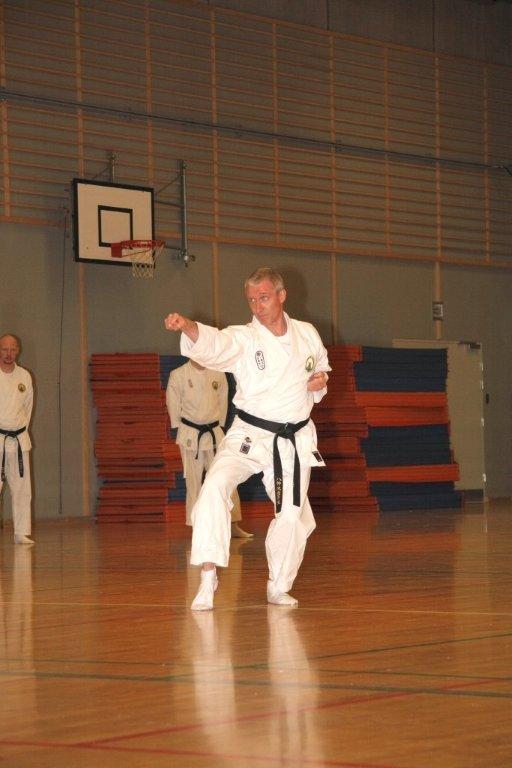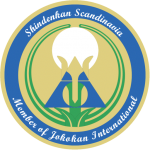It was Friday 25 February 2011 and I was going to the year's first 3-day Honbu-dojo management and competence seminar for 5th-7th graders. Dan. It was late and at was 21.00 when I picked up Kimu Sensei and we left for our destination in Malmö, where the course was to take place.
Normally Kimu Sensei is much hungrier than me, but this day I was ready to give him competition on the post since I had just left Shindenkan's Task Fighting course 3 and hadn't eaten since lunch. We reached our destination at 22.00 and after leaving our luggage and a very quick shower, we finally had something to eat.
Specialist vs. Generalist.
While we ate we talked about the TF3 course and what my results had been and when we finished and at It was 11.30pm and Kimu Sensei said to me: "Now you have a task! "You must write down the essence of the TF3 course, which in your opinion is a 'Masters view'. We meet again at 7.00 for breakfast – enjoy.
I've gotten used to the fact that I usually don't know what I'm going to do before we get started and that's how it is with Honbu-dojo management seminars. No matter what time is or what the task is about, then you are either ready to meet the development tasks you are given or you are not... - if you are not, you should not go, it would be a waste of Kimu Sensei's time!
It must of course be said that if you don't have confidence that the tasks you are faced with are both constructive and developmental, even if you can't see it - you have a problem!
I don't have that problem anymore - although I would like to decide everything J So I started writing and stopped at approx. 04.00, by which time it was sold out.
I got up at 5.45 and to finish my assignment and wrote on it for approx. an hour, after which I thought I had finished well and hurried to the shower so that I could come downstairs for breakfast at 07.00.
After breakfast we met again and Kimu Sensei quickly read through what I had written and then gave me the following evaluation:
It is excellent what you have written, it is just not a 'Masters view'! You have not dealt with TF3's connection with other courses in the syllabus, with TG and the degree where the course is for. In other words, you have written about TF3 as a separate topic and not as part of a whole - the whole called Yakami Shinsei-ryu Karate-do!
It is actually one of your big challenges that you consider everything as a project! You know the expression that you can't see the forest for the trees and why not? That's because you're just looking at the trees and not the forest!
In order for you to develop further, you must change quite away from being project-oriented to being holistically oriented and I would like to you becomes holistically oriented.
Recognized!
For me there was 100 % recognition, for that is too easy for me to stay in the project mindset, something I'm actually good at. Every time I am faced with a task that needs to be solved - I structure it and solve it quickly and efficiently. Look, this is something I can do!
But it also means that I act based on the basic assumption that all tasks are independent - instead of all tasks being connected! Kinda rubbish or is it?
Not really because it is about tasks that I carry out and therefore they are connected - it is me who is the connection.
When I think about it, I consider being holistically oriented, having an overview as inactivity, i.e. no action, and being project-oriented, performing actionable, as activity. That is to say, something with an overview is inactive and teaching (negative) compared to performing as something active and creative (positive).
There seems to be something with the law in this view or something... because what Kimu Sensei told me about myself and what he wanted me to do, on the other hand, is not about sitting back and just having an overview, because then there is no action! It's about maintaining an overview while acting.
This means that, in my world, everything happens with a starting point in myself – overview or action – can become overview and action.
Overview also means clarifying what I can and can't do instead of - what I think I can and what I think I can't. So it's yin and yang - or management - management of myself!
Overview or action - can even become an overview and action in accordance with the overview.
In his evaluation, Kimu Sensei drew a very clear picture of me which I must admit - fits. It's not about what I do on a good day, it's about my preferred action pattern when I'm under pressure - whether it's work pressure or kumite pressure. It's just a question of who puts that pressure.
It is black or white.
Later that day we were in the dojo and the first thing we had to train was of course TF3, because as Kimu Sensei said now I had been on a course in the omote version and now we have to train the ura version - that is, at my own level.
First of all, it is about not being hit by not being there, the next step is about not being hit by parrying, further to what can be called controlled contact where in a real fight you will be hurt and finally where you is hit uncontrollably - the latter equals death.
So the framework was set for TF3 ura and they weren't really that much different from the 4 steps For TF3 omote - and yet - there is kumite in the local dojo, and there is kumite at TF3, - and then there is Kumite with Kimu Sensei ..
In the TF3 course at Tjørnelyskolen, I was not pressured at all, it was completely white and I was on top and did not feel that I could be hit. In TF3 with Kimu Sensei, it was the exact opposite, I was under total pressure all the time and it was really hard to get things together - it actually didn't work.
I was under a lot of pressure! And then it's good to have some humor because during the Kumite, Kimu Sensei also started picking at my nose while parrying my attacks, which he thought was really funny - I also think it was a bit funny...
We finished the karate training with Koryu Naihanchi, which was really cool – Naihanchi has always been one of my favorite kata.
After that, I was taught an hour in core stability training, which I think is a super good supplement to karate and it is hard training for the whole body - it is definitely something that I would like to train a lot more.
The blind side.
Ok, the framework was given, drawn and told - simple, there were only 4 steps - so it was just up to me to paint a picture!
But what the hell went wrong in relation to the TF3 course, was I on top of it? Was it just Kimu Sensei pushing me to my highest level? Does this really mean that it is only a matter of who puts the pressure on me that shows whether I am good or bad.
No, it means I forgot to paint a picture! I had got the frames and instead of just painting the picture and letting it happen, I looked at the colors - one at a time. Look there - there comes the red color, good thing I recognized it before it landed on my jaw! And no, just look, now the yellow color is also coming, if I hadn't been aware of it, I wouldn't have felt it on my chest.
In other words, I can't see the forest for the trees or each color in my painting is a separate project with no context to the image.
Kumite is filling out the frame. To paint a picture is to create the whole, to apply each individual color is a project that is only carried out to be a building block in the picture of the whole - what?
It is actually reminiscent of the work process Kimu Sensei uses around courses and course instructors, where Kimu Sensei designs the framework of the course and I, as the course instructor, paint the picture – this is Shindenkan leadership development – training to be the picture instead of being a color of the hallway.
My paradox
My paradox is that I want so badly to succeed, because in my eyes it establishes that I am good enough as I am, so that I don't have to change, but I can't succeed because I fundamentally don't want to change.
I need to change, but in order for me to change I need to know who I am?
This has nothing to do with: "not being good enough", this has something to do with the realization that I have to change in order to develop.
Project oriented or holistically oriented.
Although as a person I have become much more holistically oriented both as a leader and as a person in thoughts and words, I still use my basic abilities to solve tasks as non-cohesive projects, which means that there is no consistency between my thoughts, words and actions.
Transferred to kumite, where as a martial arts practitioner I find the black and white answers, it's bad! If every tree in the forest that I see is a challenge to reach my goal, then it will be a long way home
At this training camp, I have noticed that my future training camps with Kimu Sensei will be different - going forward it will be more and more me who has to pull Kimu Sensei and not the other way around, as it has been so far.





